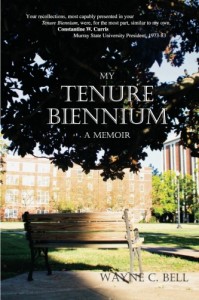
Rachel Clifford
Staff writer
Former Murray State professor, Wayne Bell has written a book titled “My Tenure Biennium,” a memoir about the two-year process through which he acquired tenure.
“Most people have a tenure year, in which they go through an intense procedure and if anything goes wrong, you have a second year to appeal, which is what I did,” Bell, author and retired math professor, said. “The thing that makes it worth telling is that it happened during the Curris era.”
Constantine W. Curris was president of Murray State from 1973-1983, which was an era of transition for the University.
“The University was in transition from a sleepy little college to the dynamic university that it is now,” Bell said. “They hired someone to make that transition and that someone was Constantine Curris, who is currently chairman of the Board.”
During Curris’s time as president, a difference of opinion led to a feud between him and the Board of Regents.
“The book presents in an overview the situation between the president and the Board of Regents,” Bell said. “It was in the middle of his fifth year, right before I went up for tenure, that Curris and the Board first went to war.
“Curris went outside the system and got the courts to intervene and won. The Board, however, was still the Board and there were five of them that still wanted him out of the president’s office.”
However, the Board of Regents wasn’t the only group with split opinions of Curris.
“On campus, there was only one dean who opposed the president and lined up with the Board, and that was my dean,” Bell said. “The chairman of the department sided with the dean. The chairman, out of nowhere, decided I shouldn’t be tenured. That shook me because
four or five months before, he wrote a letter of recommendation for the highest teaching award on campus.”
Bell believes that his tenure case was used by the president to expose the wrong-doings of the dean.
“My thesis is that the president used my case to expose the misbehavior of the dean, because he couldn’t just publish it,” Bell said. “All the things they were doing were in confidential tenure files. Confidential tenure files can’t be made public.
“There is one case in which they can be made public and that is if you’re denied tenure, there will be a tenure appeal hearing and during that hearing, everything will be made public.”
Bell said he kept all the notes and material from his tenure appeal to make sense of what had happened during the case.
“The whole tenure denial event was profoundly embarrassing to me,” Bell said. “I felt that the essence of who I was had been questioned up and down the line and I was very confused about it all. I thought that a lot of chicanery, to use Curris’ word, had gone on, so I kept those things in the hopes of sorting it all out and maybe seeing it more clearly later.”
Two people convinced Bell to write the book — Rob Donnelly, a current Murray State math professor, as well as a close friend of Bell’s, and a lifelong friend, Brenda Bell.
“When I did start talking about what happened, it usually involved talking about two points,” Bell said. “First, that the dean officially voted for me and worked against me behind the scenes, and that the Provost (formerly Vice President of the Academic Program) officially voted against me and worked for me behind the scenes.
“Rob Donnelly, in the math department, convinced me that it was indeed a story that ought to be told. He thinks that it documents a ‘watershed moment in the mathematics department … and perhaps a coming of age moment in the University.’ Also, Brenda, a life long friend — whom you will meet in the book — thought that it would be cathartic for me.”
Bell hopes that the book will show readers the importance of protecting the integrity of the tenure process.
“The reader will get an idea of how the tenure process normally works at Murray State and how important it is to protect the integrity of that process,” Bell said. “The chairman and the dean in my case had gotten crossways with Curris and, for their own purposes, did not protect the integrity of that process.
“In fact they abused the process and provided Curris an opportunity to exploit their misbehavior. I also think the reader will get a little insight into Dino Curris.”
“My Tenure Biennium” is available on Amazon.com or at the University Store.



























































































